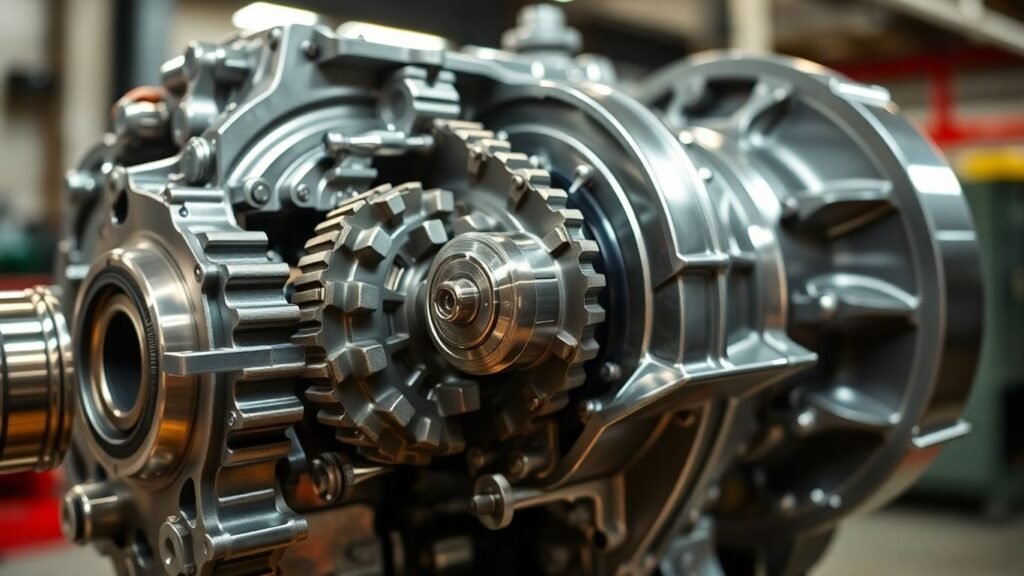So, your Honda’s transmission is acting up, huh? It’s a common worry, and honestly, it can be a real headache. You might hear weird noises, feel some shaking, or notice it’s not accelerating like it used to. Whatever it is, it’s natural to wonder what’s going on and what your options are. This article is here to help you figure out the whole Honda transmission supplier situation and what to do next.
Key Takeaways
- First things first, get a proper diagnosis for your transmission issues. A mechanic or Honda dealer can pinpoint the exact problem, whether it’s low fluid, worn parts, or something else.
- If it’s a minor issue, a transmission fluid change might help, but always use genuine Honda CVT fluid.
- Sometimes, only specific parts like solenoids or seals need replacing, which is cheaper than a full transmission swap.
- If the transmission is beyond repair, you’ll likely need a full replacement, so find a good shop that offers a warranty.
- If you’re dealing with repeated problems, look into legal options like lemon laws or class action lawsuits, and consider consulting a consumer protection attorney.
Understanding Your Honda Transmission Issues
So, your Honda’s transmission is acting up. Maybe you’re hearing weird noises, feeling jolts, or noticing a delay when you hit the gas. It’s definitely a cause for concern, and it’s easy to start worrying about the worst. But before you panic, let’s break down what might be going on and what you can do about it. Getting a clear picture of the problem is the first step to finding a solution.
Initial Diagnosis of Transmission Problems
When you first notice something’s not right with your transmission, the absolute best thing to do is get it checked out by a professional. Trying to guess what’s wrong can lead you down the wrong path and cost you more money in the long run. A qualified mechanic or a Honda dealership can hook up diagnostic tools and figure out the exact issue. It could be something as simple as low transmission fluid, or it might be more complex like worn-out clutch packs, faulty sensors, or internal damage. Knowing precisely what’s happening is key to deciding whether a simple fix or a bigger repair is needed.
Transmission Fluid Change Benefits
Transmission fluid is like the lifeblood of your transmission. Over time, especially with heat and constant use, this fluid breaks down. It loses its ability to lubricate and cool the transmission’s moving parts effectively. If you haven’t had your transmission fluid changed in a while, a fresh batch might actually smooth things out and resolve minor issues. It’s important to use the correct type of fluid specified by Honda, especially if you have a Continuously Variable Transmission (CVT), as using the wrong kind can cause more problems. While a fluid change can sometimes help, it’s not a magic fix for worn-out parts.
Repairing Specific Transmission Components
Sometimes, the whole transmission doesn’t need to be replaced. If the diagnostic points to a specific part that’s failing – like a solenoid, a seal, or a valve – it might be possible to just replace that single component. This is usually a much cheaper and faster option than swapping out the entire transmission. It’s definitely worth asking your mechanic if this is a viable solution for your particular problem, assuming the main housing of the transmission is still in good shape.
It’s easy to get overwhelmed when your car starts making strange noises. Taking a deep breath and focusing on getting a proper diagnosis can save you a lot of headaches and money down the road. Don’t just assume the worst; let the experts figure out what’s really going on.
When Transmission Replacement Becomes Necessary
So, your Honda’s transmission is acting up. Maybe it’s making weird noises, or perhaps it’s just not shifting like it used to. It can be pretty unsettling when your car starts giving you trouble, especially with something as important as the transmission. Sometimes, the issues are minor and can be fixed with a simple fluid change or by replacing a small part. But other times, the problem is bigger, and you might be looking at a full transmission replacement. This is usually the last resort when repairs aren’t feasible or cost-effective.
Full Transmission Replacement Options
When it’s clear that your transmission can’t be salvaged, you’ve got a couple of main paths to consider for replacement. You can opt for a brand-new transmission, which is typically the most expensive but also offers the longest lifespan and a full warranty. Another common choice is a remanufactured transmission. These have been taken apart, cleaned, inspected, and rebuilt with new or reconditioned parts to meet original factory specifications. They’re generally less costly than new ones and often come with a solid warranty too. Then there are used transmissions, which are the cheapest option but also carry the most risk, as their history and condition can be uncertain. It’s really about balancing cost with peace of mind.
Choosing a Reputable Repair Shop
Finding the right place to do the work is just as important as the transmission itself. You want a shop that knows Hondas, especially their transmissions. Look for places that have good reviews online, ask friends or family for recommendations, or check if they specialize in transmission work. A good shop will be transparent about the costs, explain what needs to be done, and provide a clear warranty on both the parts and the labor. Don’t be afraid to get a second opinion or a quote from a couple of different places before you commit. A warranty is key here; it means they stand behind their work and will fix any issues that pop up later without you having to pay extra.
It’s easy to get stressed when your car needs a major repair like a transmission replacement. Take a deep breath and remember that getting a proper diagnosis first is always the best step. This way, you know exactly what you’re dealing with before deciding on the most expensive option.
Exploring Legal Avenues for Transmission Defects
So, your Honda’s transmission is acting up, and it’s more than just a minor annoyance. Maybe you’ve been back to the shop a few times already, and the problem just keeps coming back. It’s a frustrating situation, and you might be wondering what your options are beyond just paying for more repairs. Thankfully, there are some legal paths you can explore if you’re dealing with a persistent transmission defect.
Understanding Lemon Law Protections
Most states have what’s called a "lemon law." Basically, it’s designed to protect consumers when they buy a vehicle that turns out to have significant defects that the manufacturer or dealer can’t fix after a reasonable number of tries. For transmissions, this often means if your Honda has been in the shop for the same issue multiple times, or if it’s been out of commission for a long stretch due to repairs, it might qualify as a lemon. Each state has its own specific rules about how many repair attempts or how many days out of service are needed to meet the criteria. If your car is deemed a lemon, you might be entitled to a refund or a replacement vehicle.
It’s important to keep detailed records of all repair attempts, including dates, what was done, and any costs incurred. This documentation is key if you decide to pursue a lemon law claim.
Legal Claims Against Dealerships
If the dealership has been the one attempting the repairs, and they haven’t managed to fix your transmission problem, you might have grounds for a legal claim against them. This could be because they failed to properly diagnose the issue or didn’t perform the repairs correctly. Sometimes, a dealership might be willing to negotiate a settlement if they realize they’ve made multiple unsuccessful attempts. If they’re not cooperative, you might need to consider further legal action.
Navigating Small Claims Court
For less severe financial disputes, small claims court can be an option. If the amount of money you’re seeking for damages or repair costs is below a certain limit (which varies by state, often between $5,000 and $10,000), you can usually file a case here without needing a lawyer. It’s a more straightforward process, but you’ll still need to present evidence to show why the dealership or repair shop is responsible for the faulty repairs. It’s a way to try and get some money back without the high costs of hiring legal representation.
Alternative Dispute Resolution Methods

When you’re facing transmission troubles with your Honda and the usual repair attempts haven’t worked, there are other ways to try and sort things out besides just going straight to court. Sometimes, these methods can be quicker and less of a headache.
Joining Class Action Lawsuits
If a lot of Honda owners are experiencing similar transmission problems, there might be a class action lawsuit already in the works or one that could be started. These lawsuits group together many people with the same complaint against a company. When a class action gets going, it can sometimes push the manufacturer to offer some kind of settlement. This could mean getting money back for repairs you’ve already paid for, an extended warranty, or other forms of compensation. It’s worth looking into if you hear about one for your specific Honda model and transmission issue.
Utilizing Arbitration Processes
Many new car warranties, including those from Honda, have clauses that require you to use arbitration to settle disputes before you can take further legal action. You’ll want to check your specific warranty details to see if this applies to your situation. Arbitration is generally a more informal process than a courtroom battle. It’s often faster and can be less expensive. An arbitrator, who is like a neutral third party, will listen to both sides and make a decision. It’s a way to resolve the issue without the full legal rigmarole.
Sometimes, the simplest path forward isn’t the most obvious one. Exploring options like class actions or arbitration can save you time, money, and a lot of stress compared to a lengthy court case. It’s about finding the most effective way to get your Honda transmission problem resolved without getting bogged down in complicated legal procedures.
Seeking Professional Legal Assistance
Sometimes, no matter how many times you take your Honda in for transmission trouble, the problem just keeps coming back. It can be incredibly frustrating, and frankly, a bit of a headache. When you’ve exhausted the usual repair routes and feel like you’re just going in circles, it might be time to think about getting some professional help. This is where lawyers who specialize in consumer protection and lemon laws can really make a difference.
Consulting a Lemon Law Attorney
Every state has laws designed to protect people who buy cars that turn out to be lemons – basically, vehicles with defects that can’t be fixed after a reasonable number of tries. If your Honda’s transmission has been in the shop multiple times for the same issue, or if it’s been out of commission for a long stretch, it might qualify. A lemon law attorney can look at your specific situation, figure out if your car meets the state’s criteria, and explain your options. They can help you pursue a resolution, which could mean getting Honda to buy back the car or provide a replacement. It’s a complex area, and having someone who knows the ins and outs can save you a lot of stress and potentially get you a much better outcome than trying to go it alone.
Consumer Action Law Group Services
Firms like the Consumer Action Law Group focus on helping consumers who are dealing with vehicle defects, especially transmission problems. They understand the laws that protect you and have experience dealing with car manufacturers. When you contact them, they’ll review your case, assess whether your vehicle qualifies under lemon laws, and then work on your behalf. This could involve negotiating with Honda for a settlement, like a refund or a new vehicle, or even taking legal action if necessary. They aim to take the burden off your shoulders so you can focus on getting back to a reliable car.
Dealing with persistent car problems can feel isolating. It’s easy to feel like you’re up against a giant corporation with no real power. However, understanding your rights and knowing where to find help can change that perspective entirely. Professional legal guidance is there to level the playing field and ensure you’re treated fairly.
Honda Transmission Supplier Information

When your Honda’s transmission starts acting up, it’s natural to wonder who’s actually making that complex piece of machinery. For a long time, Honda has largely handled its transmission production in-house, meaning they design and build many of their own transmissions. This is pretty common for major automakers who want tight control over their vehicle’s performance and reliability. However, it’s not always a simple ‘one-size-fits-all’ answer, as different models and generations might use transmissions sourced from different facilities or even specialized divisions within Honda. The primary supplier for most Honda transmissions is, in fact, Honda itself.
Identifying the Primary Honda Transmission Supplier
Pinpointing a single, external company as the primary supplier for all Honda transmissions is tricky because Honda’s strategy has been to develop and manufacture a significant portion of their transmissions internally. They have dedicated plants and engineering teams focused solely on this. For instance, their Continuously Variable Transmissions (CVTs), which have been common in many models for years, are largely Honda’s own design and production. This internal approach allows them to integrate transmission performance closely with engine technology and overall vehicle dynamics. While they might source certain specialized components from other manufacturers, the core transmission unit is typically a Honda product. If you’re looking at a specific model, checking its service manual or consulting with a Honda dealership can often provide more detailed information about the transmission’s origin within Honda’s manufacturing network.
Evaluating Aftermarket Transmission Options
Sometimes, especially if a repair is needed outside of warranty or if a full replacement is the only viable option, you might look into aftermarket transmissions. These aren’t made by Honda but by other companies specializing in automotive parts. When considering an aftermarket transmission, it’s important to do your homework. You’ll want to look for reputable brands known for quality and durability. Some well-known aftermarket transmission providers include companies like Jasper Engines & Transmissions or Remanufacturing Industries of America, though their availability for specific Honda models can vary. Always check reviews and warranty terms carefully before purchasing an aftermarket unit. It’s also a good idea to discuss these options with your mechanic; they often have experience with different aftermarket brands and can recommend one that’s likely to perform well in your Honda.
When you’re faced with transmission issues, getting a proper diagnosis is the first step. Before jumping to conclusions about replacement, a mechanic can tell you if it’s a minor fix, like a fluid change, or if a bigger job is really needed. Sometimes, individual parts within the transmission can be swapped out, which is way cheaper than a whole new unit. It’s worth exploring all the repair possibilities before deciding on a full replacement.
Wrapping Up Your Honda Transmission Journey
So, you’ve been dealing with some transmission trouble in your Honda. It’s a headache, for sure. We’ve talked about how Honda doesn’t really have one single supplier for all their transmissions; it’s more about the specific model and year. The main thing is to get a good diagnosis first. Don’t just guess what’s wrong. Sometimes it’s a simple fluid change, other times it’s a bigger job like replacing parts or the whole transmission. If you’re feeling stuck or like you’re not getting anywhere with repairs, remember there are legal avenues like lemon laws or even small claims court. It’s a lot to take in, but knowing your options is the first step to getting your Honda back on the road smoothly.








